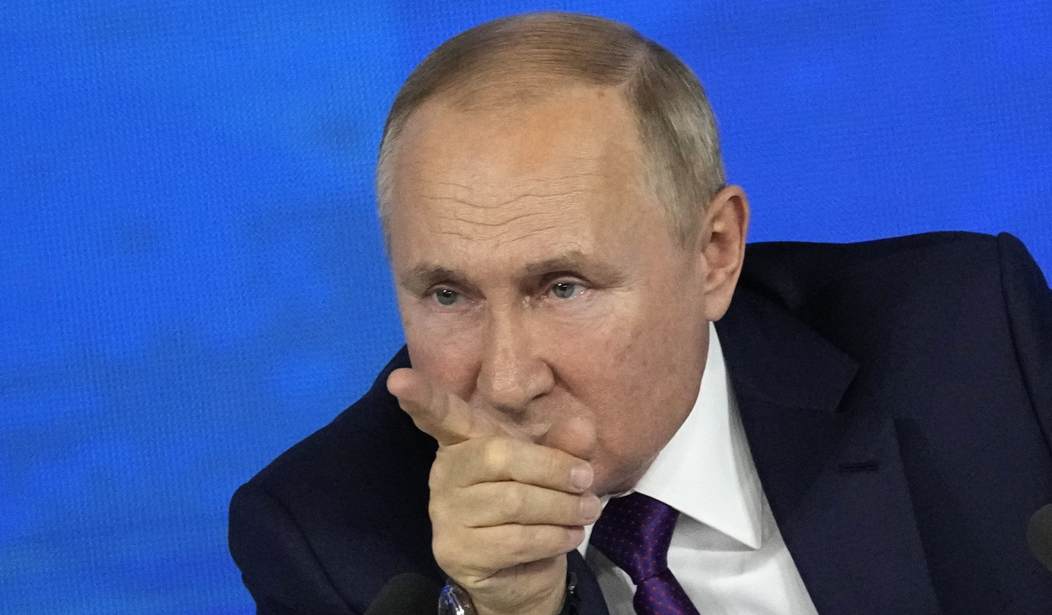For a military genius that can’t even roll over a peaceful and lightly armed neighbor, Vladimir Putin certainly likes to talk tough. Finding himself and Russia on the verge of a historic humiliation, Putin’s now trying a madman strategy to get the West to back down in its support of Ukraine and expansion against the threat Putin represents.
First and foremost, Putin tells the US that continued weapons transfers would result in “unpredictable consequences,” a threat Russia forwarded through diplomatic channels to the US State Department:
Russia this week sent a formal diplomatic note to the United States warning that U.S. and NATO shipments of the “most sensitive” weapons systems to Ukraine were “adding fuel” to the conflict there and could bring “unpredictable consequences.”
The diplomatic démarche, a copy of which was reviewed by The Washington Post, came as President Biden approved a dramatic expansion in the scope of weapons being provided to Ukraine, an $800 million package including 155 mm howitzers — a serious upgrade in long-range artillery to match Russian systems — coastal defense drones and armored vehicles, as well as additional portable antiaircraft and antitank weapons and millions of rounds of ammunition.
There’s no doubt that these weapons are adding fuel to the fire in Ukraine. Those weapons transfers are keeping the Russians from annihilating Ukraine, or at least slowing the process down to allow Ukrainians to stand up to their invaders. The Russians wanted a walkover, and more importantly expected one, but have fumbled their way into a real war — and one they’re not winning, if not exactly losing so far, despite their massive materiel and manpower advantages.
As one senior administration official smirked, there’s no better way for Russia to confirm the effectiveness of US policy than with this note:
“What the Russians are telling us privately is precisely what we’ve been telling the world publicly — that the massive amount of assistance that we’ve been providing our Ukrainian partners is proving extraordinarily effective,” said a senior administration official, who spoke on the condition of anonymity about the sensitive diplomatic document.
There’s also no better way to confirm that Russia’s pretty much at max effort in Ukraine. If they had more forces to send, Putin would have sent them already rather than engage in impotent warnings about “consequences.” Putin knows well enough that the West can deliver “consequences” too, and a hell of a lot more effectively than Russia. We’re already delivering economic “consequences,” and given the performance of Russia’s army and navy, Putin had better hope we don’t start delivering military “consequences” at this particular moment.
Speaking of impotence, Putin’s still trying to scare Finland and Sweden away from their clear ambitions to join NATO in the wake of Putin’s military aggression. It’s having the opposite effect, as Finland’s former prime minister predicted it would last week:
One of Russian President Vladimir Putin’s closest allies warned NATO on Thursday that if Sweden and Finland joined the U.S.-led military alliance then Russia would deploy nuclear weapons and hypersonic missiles in a European exclave.
Finland, which shares a 1,300-km (810-mile) border with Russia, and Sweden are considering joining the NATO alliance. Finland will decide in the next few weeks, Prime Minister Sanna Marin said on Wednesday.
Dmitry Medvedev, deputy chairman of Russia’s Security Council, said that should Sweden and Finland join NATO then Russia would have to strengthen its land, naval and air forces in the Baltic Sea.
Medvedev also explicitly raised the nuclear threat by saying that there could be no more talk of a “nuclear free” Baltic – where Russia has its Kaliningrad exclave sandwiched between Poland and Lithuania.
Ah, Kaliningrad. Does Russia really want to make Kaliningrad an issue? Right now they can’t even relieve their forces northern Ukraine via subservient Belarus. A blockade of Kaliningrad would make it impossible for Russia to move any of those assets into the Baltic Sea. Furthermore, NATO could easily respond by reversing course and populating Poland with missile and anti-missile platforms, as the US planned to do but then reversed course to appease Putin.
And of course, if Putin did that, we could just as easily park similar systems in Finland … about 150 miles from Murmansk, 100 miles from St. Petersburg, and 500 miles or so from Moscow itself. Those too could be “unpredictable consequences” from Putin’s military aggression.
None of these developments would be healthy, of course, but then again, neither is launching wars of aggression, especially in Europe. Putin should have thought through some of these consequences before choosing to annihilate Ukraine for his dreams of Greater Russia. That’s doubly true when possessing a military so woefully incapable of fighting in a straight-up war as Russia’s has proven to be. That tends to make your foes a lot less concerned about threats of “consequences,” a dynamic playing out in Finland and Sweden in real time:
Finland is “highly likely” to join NATO following the Russian invasion of Ukraine, its Europe minister has told Sky News.
Tytti Tuppurainen said that the “people of Finland have already made up their mind” and that polls show huge support for membership of the alliance.
“At this point I would say it is highly, but a decision has not yet been made,” she said.
She said Russia’s “brutal” war in Ukraine is a “wake up call to us all”.
“Not only to us Finns, it has to do with the whole security border in Europe,” she said.
Perhaps it’s time that Putin start being the one to worry about “consequences.”







